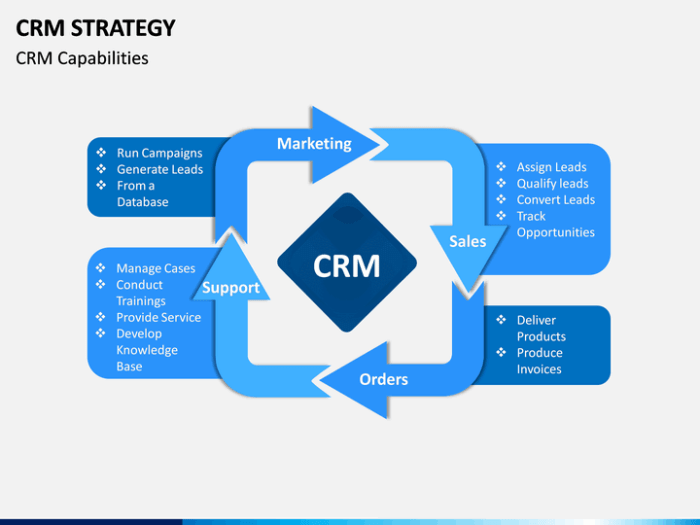Kicking off with Effective CRM strategies, this opening paragraph is designed to captivate and engage the readers, setting the tone for an insightful discussion on how businesses can leverage customer relationship management to drive success and growth. Exploring the importance, components, and implementation of these strategies, this article aims to provide valuable insights for businesses looking to enhance their CRM practices.
Importance of Effective CRM Strategies

Effective CRM strategies play a crucial role in helping businesses build and maintain strong relationships with their customers. By implementing effective CRM strategies, companies can better understand their customers’ needs and preferences, leading to improved customer satisfaction and loyalty.
Key Benefits of Implementing Effective CRM Strategies
- Improved Customer Retention: Effective CRM strategies help businesses retain existing customers by providing personalized experiences and addressing their specific needs.
- Increased Sales: By understanding customer behavior and preferences, companies can target the right audience with relevant offers, leading to increased sales and revenue.
- Enhanced Customer Satisfaction: CRM strategies allow businesses to provide better customer service, resolve issues promptly, and build lasting relationships with customers.
Examples of Successful Companies Benefitting from Effective CRM Strategies
Amazon:
Amazon is known for its highly effective CRM strategies, leveraging customer data to personalize recommendations, improve the shopping experience, and increase customer loyalty.
Zappos:
Zappos, an online shoe and clothing retailer, has built a strong reputation for its exceptional customer service, a result of its effective CRM strategies that focus on customer satisfaction and loyalty.
Salesforce:
Salesforce, a leading CRM software provider, has demonstrated the power of effective CRM strategies by helping businesses streamline their sales processes, improve customer relationships, and drive growth.
Finish your research with information from RMM mobile app functionalities and benefits.
Components of Effective CRM Strategies

Effective CRM strategies are built on a foundation of key components that work together to drive success in customer relationship management. These components are crucial in ensuring that businesses can effectively engage with their customers, understand their needs, and provide personalized experiences that lead to long-term loyalty and satisfaction.
Customer Data Analysis
Customer data analysis plays a pivotal role in shaping effective CRM strategies. By leveraging data analytics tools and techniques, businesses can gain valuable insights into customer behavior, preferences, and trends. This data-driven approach allows organizations to segment their customer base, identify key opportunities for engagement, and tailor their marketing efforts to meet the specific needs of different customer segments. By analyzing customer data, businesses can also track the effectiveness of their CRM strategies, measure the impact of their interactions, and continuously refine their approach to achieve better results.
Personalized Customer Interactions
Personalization is a key component of effective CRM strategies. By personalizing customer interactions, businesses can create meaningful connections with their customers, build trust and loyalty, and drive customer satisfaction. Personalization involves tailoring marketing messages, product recommendations, and customer service interactions to meet the individual needs and preferences of each customer. By delivering personalized experiences, businesses can demonstrate that they understand and value their customers, leading to increased engagement, retention, and advocacy.
Implementing Effective CRM Strategies

Implementing effective CRM strategies is crucial for businesses to build and maintain strong relationships with customers. It involves a series of steps to develop and implement strategies that align with the organization’s goals and objectives.
Steps to Develop and Implement Effective CRM Strategies
- Define Objectives: Clearly Artikel the goals and objectives you want to achieve with your CRM strategy.
- Assess Current Processes: Evaluate existing processes and identify areas that need improvement.
- Choose the Right CRM Tool: Select a CRM tool that meets your business needs and aligns with your strategy.
- Data Integration: Ensure seamless integration of data from different sources for a complete view of customer interactions.
- Training and Implementation: Provide comprehensive training to employees on how to effectively use the CRM system.
- Continuous Monitoring and Optimization: Regularly monitor and optimize your CRM strategy to adapt to changing customer needs.
Comparison of CRM Tools and Technologies
- Cloud-Based CRM: Offers flexibility and scalability, ideal for businesses with remote teams.
- Mobile CRM: Enables access to customer data on the go, improving responsiveness and efficiency.
- Social CRM: Integrates social media data to enhance customer engagement and communication.
- AI-Powered CRM: Utilizes artificial intelligence to analyze customer data and provide personalized insights.
Best Practices for Training Employees on CRM Systems
- Customized Training: Tailor training programs to suit the specific needs and roles of employees.
- Hands-On Practice: Provide opportunities for employees to practice using the CRM system in real-life scenarios.
- Continuous Support: Offer ongoing support and resources to help employees troubleshoot issues and maximize system usage.
- Feedback Mechanism: Encourage feedback from employees to understand challenges and improve training programs.